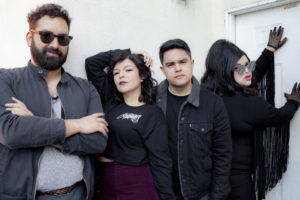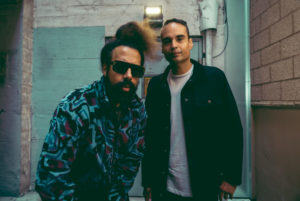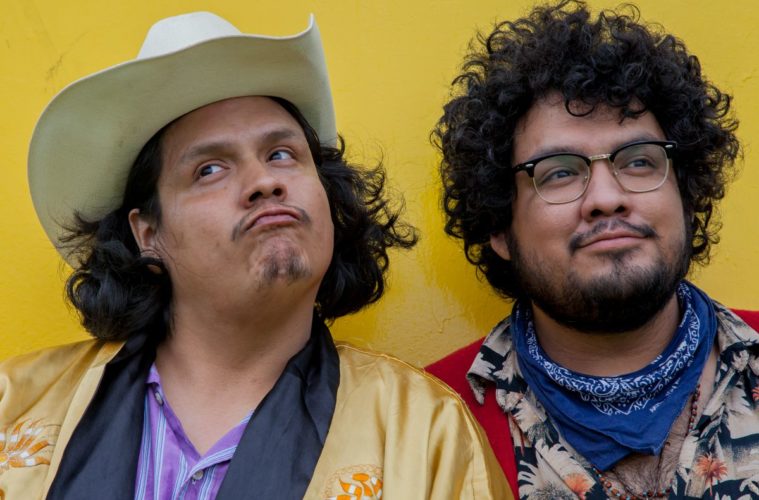While it feels like a blessing that some form of the Echo Park Rising festival is going ahead, it’s very clear that the annual event is going to be very different in 2020. For starters, it’s just the one day – Saturday, September 26. And then of course there’s the fact that the whole thing will be effectively crowd-less, livestreamed to our homes from the various Echo Park venues.
Still, the spirit is intact: a ton of local bands, venues and businesses will join forces to offer a multi-channel day of top local entertainment. Self-produced commercials will will be streamed between the performances, encouraging viewers to make purchases from those businesses including but not limited to carry-out/delivered food. Meanwhile, while the event is free, bands will accept donations.
So yeah, it’s very different. But much is the same: It’s still being produced by volunteers and, in many ways, it’s reliant on the goodwill and generosity of the community. Under incredibly challenging circumstances, it looks like we’re being presented with an event worth “turning up” for and supporting to the best of our individual ability. From a musical perspective, EPR continues to shine lights where lights deserve to be shone.
—
One such group is East L.A. band Tropa Magica, formed by brothers David and Rene Pacheco out of the ashes of local faves Thee Commons.
“The band started a few years ago,” says David. “We originally started off as another band called Thee Commons, and then we decided to expand our sound, and added more musicians. That was around 2018.”
Rene says that, while the siblings are still the core, the sound is very different.
“I would say we’ve stepped aside from the psychedelic cumbria to expand some of the soundscapes that David has brought into the mix,” he says. “It’s sort of like garage rock with a symphony in there.”
Lockdown has been difficult for the men, as it has been for pretty much everyone. Rene says that it’s been tough to feel part of any “scene” when stuck at home. Not impossible, but hard.
“There’s a lot of disassociation with people, and there is a scene but it’s all online if any,” he says. “But other than that, yeah I feel like we’re part of something. The way that some people express their gratitude towards the group, I feel like we’re part of a scene in East L.A. Like, ‘Oh my god, you guys are doing it’. When [lockdown] first happened that was scary for all of us. As it went on, everybody was kind of ok. It’s weird but it’s not the super-panic that it was at the beginning. But after that, I was cancelling weekends and just staying inside to work. If anything, now I just don’t have FOMO [fear of missing out] because I know everybody is staying home.”
Tropa Magica has remained productive during lockdown, putting out the new album Tripiando al Infinito en Mi Recámara on vinyl on September 4.
“We mixed it and mastered it over quarantine, and sent it out to get pressed,” says David. “We started a promotional campaign towards it, and that’s actually what we’re going to be promoting at Echo Park Rising in our set — this new album. But yeah, we’ve stayed really productive. Rene is creating customized doodles for the vinyl sleeves. We did all the artwork for it over quarantine.”
The band will be presenting songs from the new album during their EPR set, as they attempt to generate some of that missing crowd energy by themselves. They’ve enlisted the help of violinist Kaitlin Wolfberg to bridge the gap.
“As far as capturing the dynamic of it, it’s something that we’re just going to have to work out at rehearsals,” says David. “We just have to pretend we’re streaming at rehearsals so that it comes across a lot more fluid for the live show.”
When EPR is wrapped up, Tropa Magica will be going back into the studio to work on the follow up album, which they say will be a psychedelic cumbia record. They’re also working on a mini-documentary about the band, and comedian Felipe Esparza is using one of their songs on his Netflix special. Good times.

Trap Girl (Henry Zavala)
Drew Arriola-Sands of L.A, punks Trap Girl has had an eventful year so far. We last chatted to them in 2018 around the time of the annual Transgress Fest, and much has happened since.
“Trap Girl were kinda lucky because last year we toured in the summer,” says Arriola-Sands. “I was so upset because I was sweating and every night I would be more upset than usual. My makeup would be running, my hair — I was so sweaty. I told the guys, next year we’re going to tour in the winter. I put together a tour for early February this year, because I want to look pretty to the end of the show. So for the first time, I took Transgress Fest on the road. There were three — Oakland, Sacramento and LA. It was great.”
The experience, though positive as far as the shows were concerned, was bittersweet because Arriola-Sands lost her mother in January. The artist was considering canceling the tour, but she went ahead with the knowledge that her mom was a big supporter of Trap Girl.
“I thought that she would want me to go through with it,” she says. “Other than the tour and Transgress Fest, we had a private show. A couple wanted Trap Girl to play at their wedding, which was so weird but they paid for it. So we had a very busy month, right before COVID, and we were very lucky to blow our wad. The last jerk. Then COVID started and no one was playing shows anymore.”
In addition, Arriola-Sands tested positive for COVID-19 in April; she works in healthcare, literally on the frontlines, and an uncontained outbreak led to her, and a number of her colleagues, testing positive.
“It was very scary and I got very ill,” she says. “I was under the supervision of doctors through my phone and Facetime. That obviously put Trap Girl on hold. In a way, I’m still recovering. It wasn’t until last month that we started doing stuff again. We did our first show online. It was funny because it was pre-taped. I’ve learned that a lot of these streaming shows are not honestly 100 percent live because they need editing and stuff. But it was so good. The main band was the Yeah Yeah Yeahs.”
Arriola-Sands tested negative in late June, and has had four tests, every other week, since then — each one negative. She’s ready to go with this virtual version of EPR, with fond memories of previous years in her mind.
“We had a blast last time,” she says. “It was funny because we were last, on at midnight. The band before us, I’m not going to say who it was, but they were doing shitty AC/DC covers. I was like, ‘everybody’s gonna leave.’ But they got done and we went up, and everyone wanted to part and hang out. They wanted heavy, hardcore punk music. From the first song, everyone went crazy. I had to push guys off the stage. The crazier the crowds are, the happier I am. There was alcohol everywhere and I had a blast.”
This time, they have to find that energy themselves, which Arriola-Sands admits is a challenge.
“If we want to continue performing, then we have to adapt,” she says. “The first livestreamed show, we just did two songs. This time, we’re doing a full set and it’s harder because I was against getting filmed. Because I want Trap Girl to have an air of mystery. That allure has helped Trap Girl be what it is. To be filmed for 30 minutes and be able to see that home — it’s a sedated beast I guess you could say. Rather than standing in front of me and have me spit on you and fall to the ground. Grab you and scream in your face. It’s different.
Trap Girl’s Transwomen and Chokeholds EP came out in December. They’re working on a full length album, but the lockdown has slowed down work on that. Arriola-Sands is working on a solo album, and that will probably come out sooner. As for the set, who knows what to expect? They certainly don’t.

Wajatta (The1point8)
John Tejada of festival headliners Wajatta is a professor at CalArts, and he’s been spending much of lockdown expanding his teaching by producing online content for other schools and teaching sites, and working on some solo music. It’s been, he says, an oddly productive time. This will be his first Echo Park Rising experience in any capacity, and his set with bandmate Reggie Watts is highly anticipated.
“We’ve had some shows trying out different tech and ways to play the songs over the last 2 years,” Tejada says. “Just before the pandemic we ended on a method we felt worked really smoothly and gave us lots of options to be spontaneous during the set. So it will be really fun to play the set now that we feel we’ve finally settled on a great fit and chemistry.”
Also excited is Dublab artist Callie Ryan, who actually got started in electronic music by listening to Dublab.
“I grew up in a very musical family, primarily musical theater,” Ryan says. “My father works in film, so I was always very close to creative outlets. I grew up in Los Angeles, so I at the time was very passionate about the label Anticon, and I still am. That was my gateway into this world of music that was pushing the sonic boundaries that I had been introduced to previously. Then when I went to college, UC Santa Cruz, I studied experimental electronic production, and delved very deep into just sound and the amazing ability that sound has to move us emotionally but also on a physical level. I’m very interested in bodily systems and the ways that sound can overlap with our internal systems.”
That’s actually really interesting. Since she was young, Ryan was faced with a lot of body sensitivity issues and she used music as a means to explore and deal with them.
“One of the things I was very sensitive to was sound in the sense that it was very comforting and supportive to me,” she says. “As I explored that more and more, I thought about the ways that sound can affect different bodily systems. It can calm us, it can make us feel overwhelmed, so many different emotions. For me specifically, a lot of the inspiration for my music comes from experiences I’ve had with my body.”
That sense of peace, of soothing, comes across in her music, and other people are finding the same sense of support that she achieves herself through the tunes.
“I think a lot of people who have reached out to me who listen to my music also have body sensitivities and move through different physical challenges, and my music has felt supportive to them,” Ryan says. “That’s my goal and my hope — my music can be a space for people moving through difficult or vulnerable situations whether that’s emotional or spiritual.”
Ryan has DJ’d at Echo Park Rising before and, though she accepts that it’s going to be very different this year, she’s still sure that represents something special.
“I think it’s a really exciting time, and it’s the activation of Echo Park and the surrounding area,” she says. “When you walk down the street, there’s so much going on. So many different kinds of music are represented. It’s just a special time for people to curate events that highlight local artists.”
As for her own set, Ryan wants to offer people music that makes them feel warm, supported and safe during this difficult time.
“Even though there won’t be that face to face interaction that I’m used to at DJ and live performances, I’m hopeful that the music can connect us and the sounds can feel supportive,” she says.
For the full Echo Park Rising lineup and all of the information, visit epr.la.
Advertising disclosure: We may receive compensation for some of the links in our stories. Thank you for supporting LA Weekly and our advertisers.

